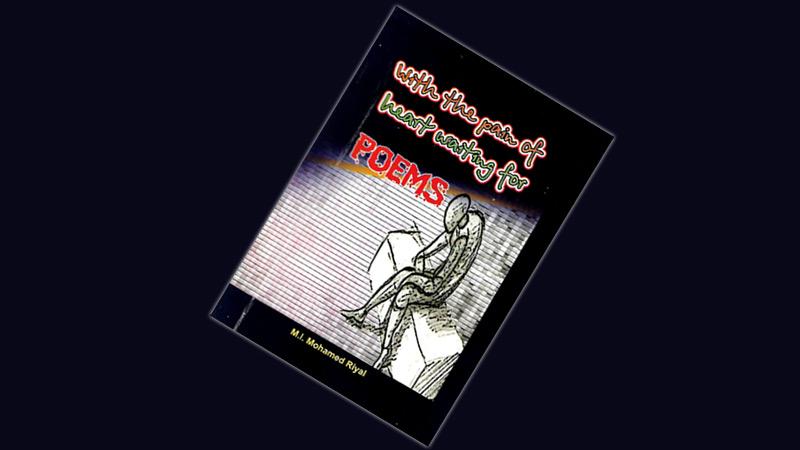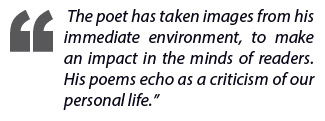
In faraway Pothuvil in the Ampara district lives M I Mohamed Riyal, whose mother tongue being Tamil, is experimenting writing poems in English. One should encourage him for his enthusiasm. He says that a scholar, Ibrahim polished his poems. This is endorsed by a school teacher, Mrs. Natheera Iqbal, who says Riyal has worked in the school as an officer. She adds:
 “After going through the expression of the poet’s inner self, in the form of poetry, I have found that the poet speaks about the neglected characters in our society. Each poem written in this book, is the utterance of a unique situation. His usage of simple words draws the attention of common readers. The poet has taken images from his immediate environment, to make an impact in the minds of readers. His poems echo as a criticism of our personal life.”
“After going through the expression of the poet’s inner self, in the form of poetry, I have found that the poet speaks about the neglected characters in our society. Each poem written in this book, is the utterance of a unique situation. His usage of simple words draws the attention of common readers. The poet has taken images from his immediate environment, to make an impact in the minds of readers. His poems echo as a criticism of our personal life.”
The title of this book running into 36 pages with 12 poems printed in glossy paper is With the pain of heart waiting for poems. The date of publication is not given. His address is: M I Mohamed Riyal, P/ 13 Co-op Road, R M Nagar, Pothuvil 27, 32500. E-mail: [email protected]. The poet has a Diploma in English from the South Eastern University.
Bro. Dr S A I Mathew too has paid a tribute to him in verse.
There is sadness and melancholy in his poems.
Loneliness and negligence of others keep him frustrated.
He feels like dying from this cruel world.
He has self-pity and a negative attitude in facing challenges in life and moving away from the sordid location where he lives.
But the best thing I can do is to refrain from commenting on all his poems as I dislike negative sensibility and quote only the first poem for the readers to judge.
“The piece of soul that remains awaiting to pass away”
The house that I lived in, is devastated to ground by thunderbolt, I am sure
Not even a dog cares to visit me anymore
Not even a doll is seen near to share my grievances, I fear
I am deprived of everything I enjoyed
I am confined to a small and lonely village where not many humans care to live
It is a far off distance, leaving you all
You may not reach me as you wish
Happiness and unhappiness are the same to me
I am myself experiencing, squatting in a corner with no access to anyone
Shut down the door in the face even for a God if has no money, all they may say
Yet you have gone further locking up all your doors and windows and covering with curtains
Alas, not even to have my look upon them. Am I the cursed?
What to do?
I am burdened with my grievances and being unable to carry them on my shoulder
I leave them behind at your doorsteps
Yet, you trod on them, spitting
The Almighty is said to be with those who bear sufferings
Yet, what I have suffered is sufficient to make two oceans
The love by better half, is after mother’s love
And thereafter you are out of the doorway
I am now under the porch counting the days of my death
You do not like to see me alive
Come wash, clean my dead body and bury after my death and go away
I raise my hands above my head and pray to The Almighty,
Thanking HIM for me to live on this earth for some days
Finally here are my poems!
The poems speaking about my grievances
I leave them behind on this earth
Let anyone who read these poems visit my grave and offer some flowers
I will be happy lying in the grave
Accepting it as reward fort the days I lived on this earth.
‘’’’’’’’’’’’’
Short note on early Lankan Tamil novels I read
The earliest novels written by Lankans in Tamil had been written in the latter part of the 19th century. The first two novels were translations from Portuguese and other sources. I have not read them. But I did read one called Araganayaki- a translation of Sir Walter Scott’s Kenilworth. But serious indigenous novels rooted on Lankan soil came to be written from the second half of the 20th century.
In view of the lack of space to mention all the novels, I would limit myself to those I have read from the earlier slot. Even Lankan readers may not have heard of them, leave alone read them. Until 1956, most Lankan readers were fascinated by the often escapist literature produced in Tamilnadu, India.
It was under the promulgation of Marxist oriented academics such as the late K.Kailasapathy and K Sivathamby stressing on local surroundings and Lankan Tamil identity and also the progressive writers falling in line that there was a Lankan consciousness that began to evolve among the Lankan Tamil literati. Even before this emergence of Marxist orient gaining importance, some local Tamil writers had begun to write about the people living around Lanka.
Whereas writing beyond the Straits were historical, romantic, imaginative and escapist in nature, Lankan writers wrote realistic and not naturalistic pieces of writing. The Yaalpaanam peninsula took dominance in depicting the caste distinctions prevailing there. Trade Union solidarity was underlined. In the East, predominantly an agricultural zone, people wrote romantic novels and were not seriously thinking of poor conditions.
In the hill country the plight of the plantation workers were spotlighted.
The number of Tamil people living in other parts of the country exceeds the number of people living in the peninsulaand yet outmoded thinking political leaders there seem to call the tune for isolation. It would be a tragedy for all of us.
